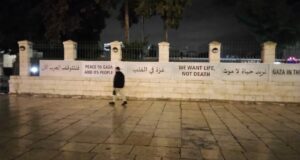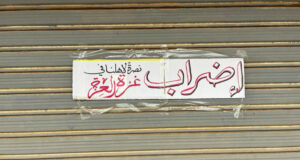Amnesty International, March 9th
There have been further attacks by Israeli settlers on human rights defenders working in the Occupied Territories. The head of one international organization working in the area has voiced concern that the lives of these human rights defenders could be in danger if the attacks continue.
On 5 March, a Swedish national working with the international observer mission, TIPH (Temporary International Presence in Hebron), which plays a protecting role in monitoring attacks on Palestinians in Hebron, was attacked by an Israeli settler in the city of Hebron. According to TIPH, Eric Mohlin and other TIPH personnel were in a car near the Israeli settlement of Beit Hadassah when a young settler hurled a large stone at the front window of the car. The car then stopped at a nearby Israeli checkpoint. As Eric Mohlin was speaking to one
of the soldiers at the checkpoint, an Israeli settler apparently threw another stone at him. Bleeding heavily, he was taken to hospital for medical treatment, first in Hebron and then in Jerusalem. He was released the following day.
The Head of Mission for TIPH, Karl-Henrick Sjursen, later stated, “This incident is only the last in a number of serious assaults on TIPH observers in this area. If this is allowed to continue, it is only a matter of time before the perpetrators will succeed in inflicting permanent bodily injury on one of their victims, or in the worst case, the loss of life.”
In a separate incident on the same day, two other human rights defenders working with CPT (Christian Peacemaker Teams) in Hebron were targeted by young Israeli settlers. Canadian national Art Arbour and British national Janet Benvie were stopped by an Israeli soldier at a checkpoint near the Beit Hadassah settlement. While the two were waiting for their identity documents to be checked, a nearby group of young male settlers, aged between 8 and 12 years,
approached them. In the presence of the soldier, who witnessed the incident, one of the young boys spat on Janet Benvie several times while another kicked her leg. Art Arbour was hit on his ear by a rock, leaving him bleeding heavily. Following the incident, the human rights defenders asked the soldier why he had not intervened. He reportedly responded that it was “not his job”.
These latest attacks are just some of many perpetrated by Israeli settlers against international human rights defenders in recent months and years, seemingly in an attempt to discourage and eliminate the presence of international witnesses, thereby depriving the local Palestinian population of this limited form of protection.
BACKGROUND INFORMATION
Israeli settlements in the occupied West Bank are illegal under international law. Israeli Settlers frequently attack Palestinians villagers. In Hebron, Israeli settlements are located in the centre of the city, resulting in stringent restrictions being imposed on the movement of the Palestinian
residents. The international organizations working there – TIPH, CPT and the International Solidarity Movement (ISM) – operate to protect Palestinians from attack since Israeli police and army are failing to do so.
No proper investigations are known to have been carried out into the complaints lodged with the Israeli police by dozens of International human rights defenders, including Amnesty International delegates who have been attacked by Israeli settlers in recent years. The same is true for the complaints lodged by Palestinian victims of settlers’ attacks. On 18 November, Tove Johannsson, a 19-year old Swedish human rights defender, was assaulted by Israeli settlers as
she accompanied Palestinian school children through an Israeli army checkpoint near the Tel Rumeida Israeli settlement in Hebron. After the attack she and her colleagues gave statements, but none of the assailants has been brought to trial. The impunity enjoyed by the settlers responsible for such violence has in turn encouraged further attacks.
 International Solidarity Movement Nonviolence. Justice. Freedom.
International Solidarity Movement Nonviolence. Justice. Freedom.


